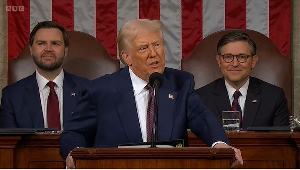Ghana needs to diversify its economy from natural resources and commodities to achieve a more balanced and diverse growth, the World Bank Country Director for Ghana, Pierre Laporte, has said.
He said the country over past decades had largely relied on commodities and natural resources for growth and job creation, which is not sustainable due to commodity price shocks.
Mr Laporte stated these in his remarks at the launch of the World Bank’s latest report on Ghana titled “Diversification through Productivity Enhancement.”
The report analyses the main challenges for Ghana’s economic diversification and productivity and proffers solutions to address them.
Mr Laporte said the need for economic diversification to create more jobs had become necessary in view of the natural resources and commodity price shocks and increasing population of the country.
He said almost 70 per cent of the country’s exports were made of three commodities, namely gold, oil and gas and cocoa and about 40 per cent of the employed work in non-wage agriculture and most urban workers were in low productivity informal jobs, primarily in the services sector.
Mr Laporte also said government’s strategy to achieve inclusive and sustainable growth with the private sector as the main driver, would require diversification of the Ghanaian economy.
“A more diverse economy that provides a shield to economic volatility from commodity cycles and that allows more people to benefit from strong economic growth is an attainable target for Ghana,” he said.
Among other suggestions, the World Bank Country Director said agribusiness, chemicals as well as textiles and apparels sectors, in the short term, presented a good opportunity for the country to diversify the economy.
“In the medium-term restructuring Technical Vocational Education Training to be better aligned with job skill and market demand would be a basis for more complex, more diversified production capabilities and in the long-term reforming land administration and systems to ease secure access to land could facilitate investment in new production facilities for agribusiness and agriculture processing,” Mr Laporte stressed.
The World Bank Senior Economist and Co-author of the report, Michael Geiger said a shift of economic activities and employment from low to high productive areas would help Ghana to overcome its concentration and challenges related to job creation.
He said capital accumulation had been a driving force for the country’s economic growth over the past decades, but the capital accumulation had been realised through increased investments concentrated in a few natural resource sectors.
The Chief Executive Officer of Private Enterprise Federation, Nana Osei-Bonsu in his analysis of the report said inefficiency in public service delivery could be blamed on the country’s poor economic performance and under development.
He also expressed concern about the high cost of finance in the country and called for measures to address them, stressing that there was no correlation between inflation and Bank of Ghana policy rate and lending rate in the country.
Mr Osei-Bonsu also said the high cost of power made the cost of doing business very high in Ghana, indicating that while the cost of power was three cents per kilowatt-hour in developed economies, the same amount of power in Ghana was about 14 cents per kilo-watt hour.
Business News of Thursday, 12 December 2019
Source: ghanaiantimes.com.gh

















